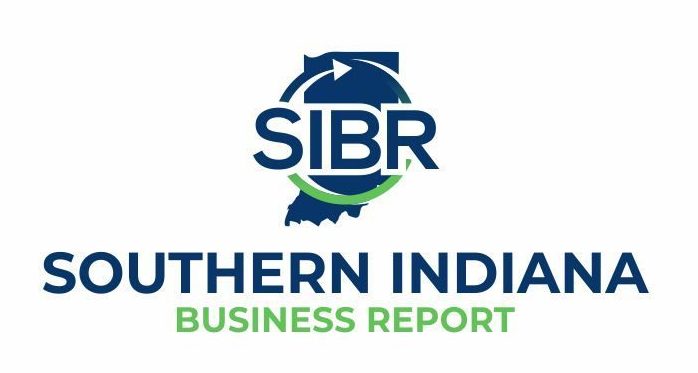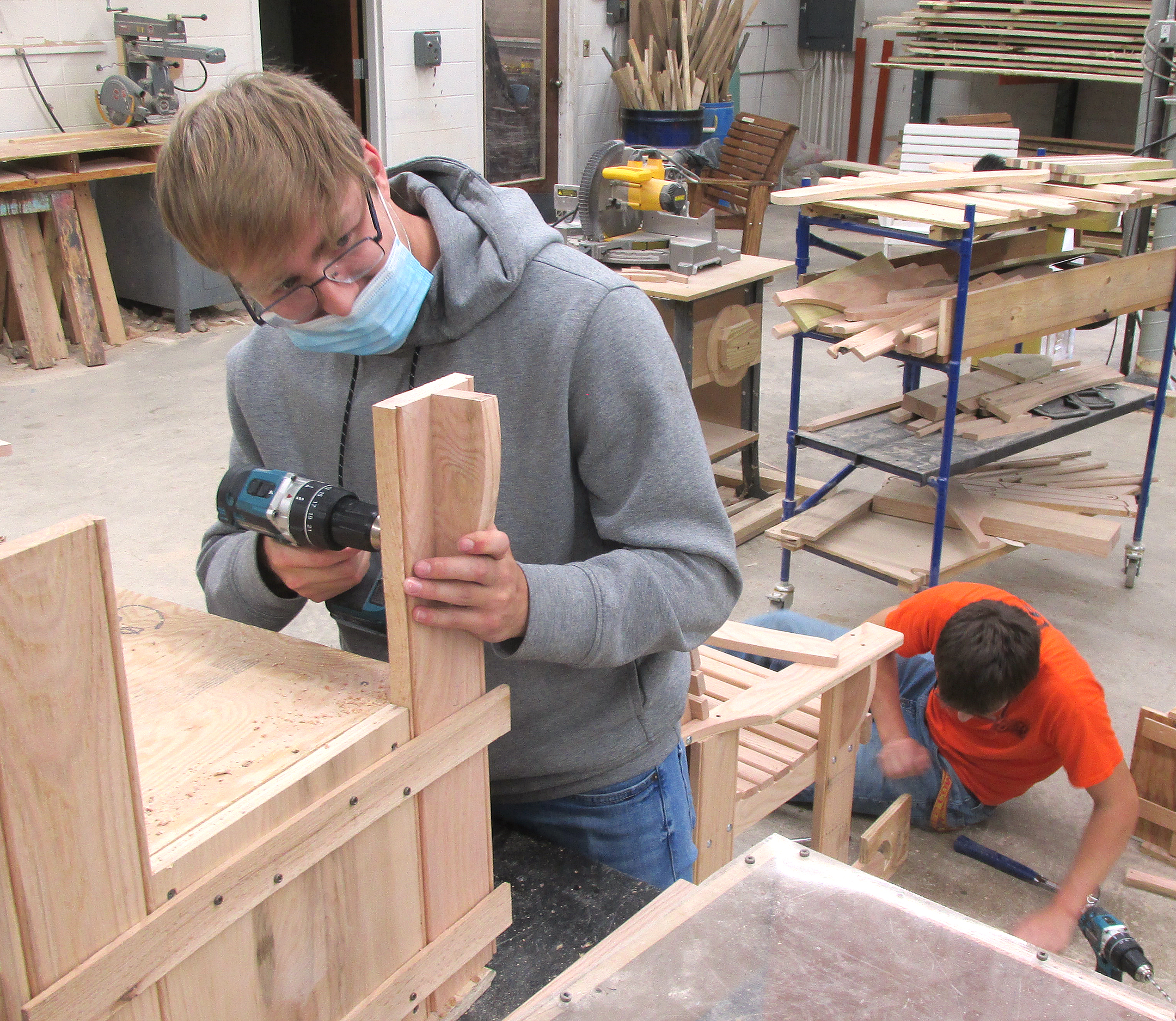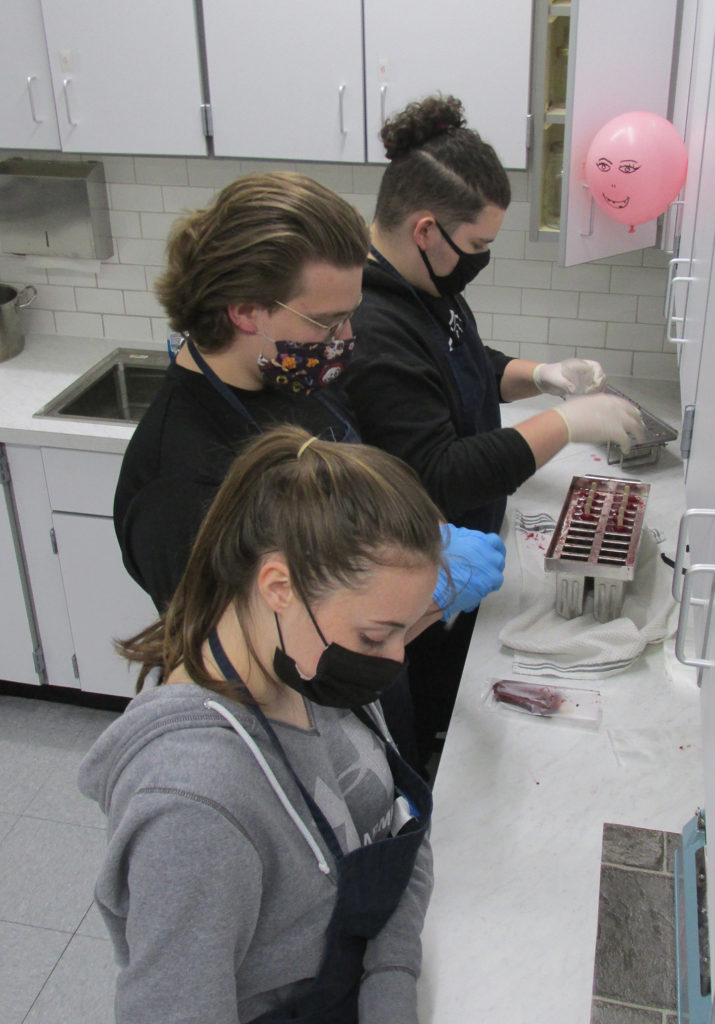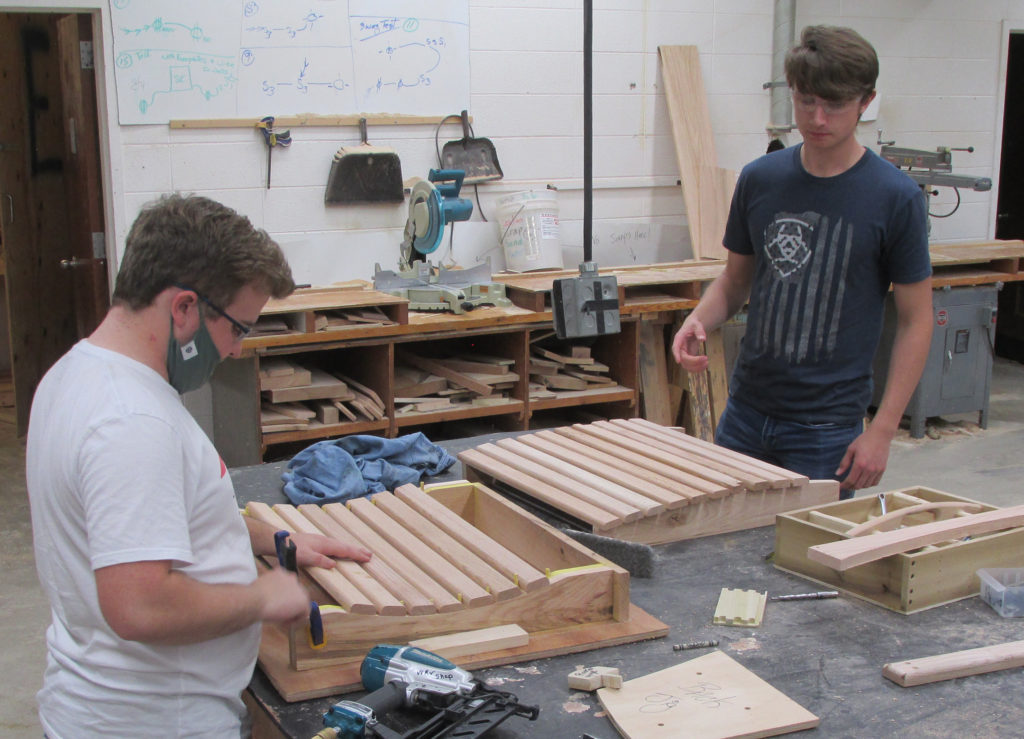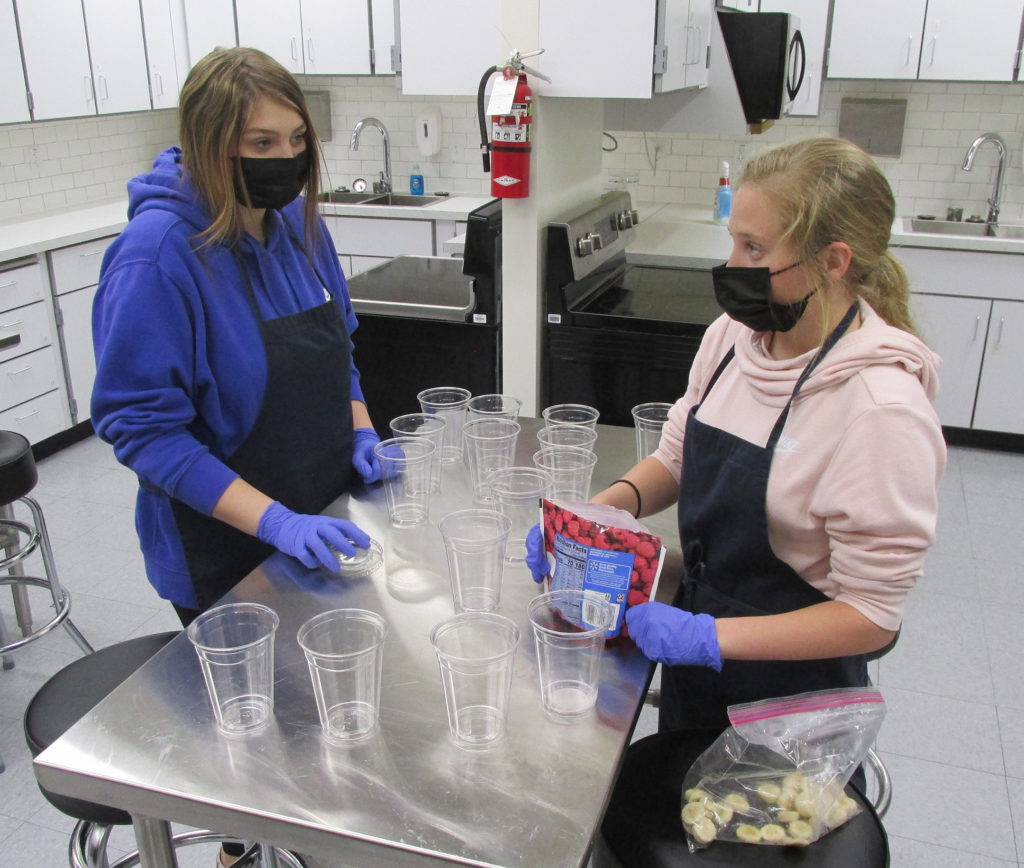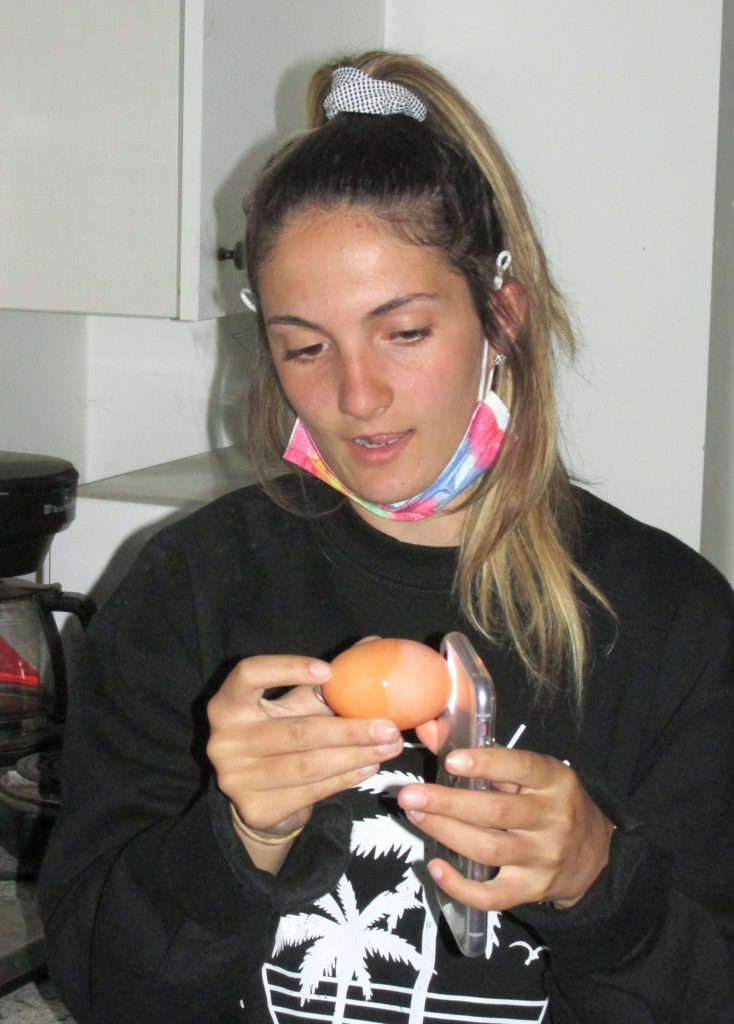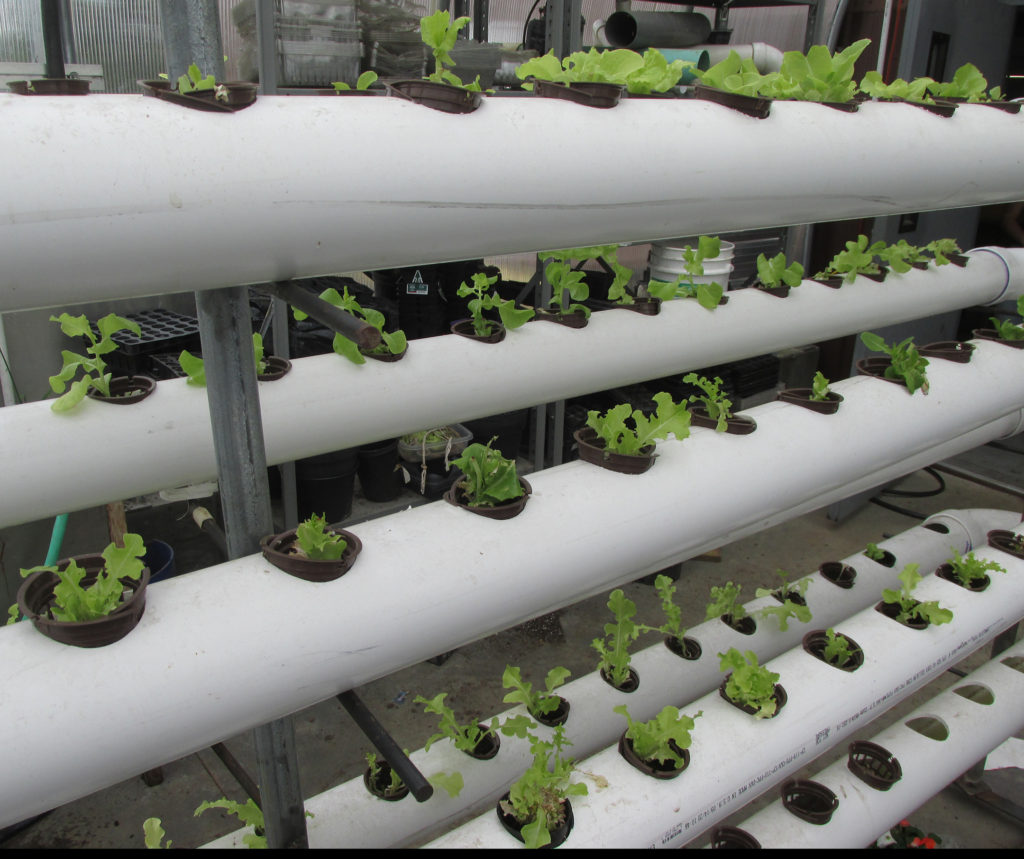By Miles Flynn | Southern Indiana Business Report
SWITZ CITY — A startup with a diversified product line launches and then sees most of its c-suite and senior leadership move on to new opportunities at the end of its first year. While that scenario might sound like the stuff of corporate nightmares, it’s all part of the plan for Wolverine Enterprises, an innovative collection of six student-run businesses operating at White River Valley High School in Greene County.
Roots of Wolverine Enterprises
Dr. Bob Hacker, superintendent of the small rural school system just west of Bloomfield, explained the beginnings of the businesses can be traced back a few years to the launch of the school’s precision machining program, thanks to the Ready Schools program of the Bloomington-based Regional Opportunities Initiative, contributions from the Greene County Community Foundation and some operations money from the school system. The addition allowed students to earn certifications in coursework through Twin Rivers Career and Technical Education Area that previously would have required them to drive 50 miles to Vincennes University.
Two years later, a further grant from ROI for planning and exploration allowed school leaders to begin considering the next step. They started by seeking direction through a survey of approximately 1,100 community patrons. What makes that number so significant, Hacker said, is there are only 770 students in the entire district.
What school leaders heard is the need for developing more local talent. One aspect of improvement was the addition of more advance placement offerings through help from the University of Notre Dame. However, Hacker said, it was clear students who might not be going on to college after graduation needed a program tailored to them in order to help them secure employment.
“Wolverine Enterprises was born,” Hacker said.
Students lead six distinct businesses
Katelyn Thomas, a math teacher at White River Valley, serves as program director for Wolverine Enterprises, and the organization is overseen by an executive board made up of Hacker, members of the school board, Principal Doug Lewis, teachers serving as faculty chief executive officer and faculty chief financial officer, and two local businesspeople. Next in line is the student logistics team — including the CEO, CFO, and specialists in marketing, sales, shipping and human resources — all working with individual student managers for each of the six businesses. Accounting students use Wave business software to keep track of everything and bill customers. Hacker noted the tiered system ensures built-in layers of accountability.
May 28, the last day of school, marks the end of service for the program’s first student CEO, Edan Martin (class valedictorian), and CFO, Katryna Zimmerly (salutatorian). They were selected for their jobs from a pool of students who submitted resumes and sat for interviews, and they’ll be replaced for the 2021-22 school year by Elliott Fulford, student CEO; Jarin Shake, student CFO; and Wade Hall, accounting manager.
Creation of the businesses themselves was also a student-driven effort, with teams making pitches to their board and answering tough questions about sustainability before approval.
“You talk about pressure,” Hacker related.
Six operations emerged:
- Wolverine Frozen Feasts, a business that allows family and consumer sciences students to earn ServSafe certification and create and market treats such as fruit smoothies, the cheesecake bites they offered for Valentine’s Day and, with a new flash freezer, popsicles.
- Ag Enterprises, a multi-faceted undertaking that includes egg production, growing greens using two indoor hydroponic systems built by students themselves, and an ag shop that offers custom welding and repairs.
- Wolverine Graphics and Design, which specializes in creating banners, yard signs, shirts, window decals and other promotional materials.
- WRV Custom Manufacturing, which specializes in rocking chairs, camp tables, picnic tables and more.
- WRV Fine Arts and Design, where students create custom art products that can be functional and decorative.
- Precision Machining, a business focusing on metal work utilizing CNC plasma cutting along with other technologies.
The operations are designed to dovetail into just about every subject at White River Valley.
“We do CTE (career and technical education) pretty well here, and we thought we could do it in every area,” Hacker said.
He credits buy-in from the school’s stable of outstanding educators for making it all work so well.
“They’ve done great,” he said. “I’m very proud of them.”
All 93 juniors and seniors take part in one of the businesses for 70 minutes every school day. Freshmen and sophomores, meanwhile, are being prepared for the program, and for their own next steps in life, through life skills training on items like resumes and job applications, etiquette and other vital skills.
Taking a surprise hurdle in stride
COVID-19 has presented Wolverine Enterprises with several unexpected challenges, beginning before the businesses even launched. Following ROI’s announcement last spring that White River Valley would be receiving a $250,000 implementation grant, the plan had been to use the weeks ahead of the 2020-21 school year to organize and prepare. The pandemic ruled that out, though, and forced school and student leaders to get busy building the program when classes were actually starting last fall. Even then, they were often working around hybrid schedules.
Once the businesses were launched, the pandemic also had a major impact on community outreach and forging partnerships with area businesses, which had always been envisioned as major components of Wolverine Enterprises. However, despite COVID-19 slowing everything down, the efforts have been successful. Students work with Owen County State Bank, which visits the school twice weekly to pick up deposits from the logistics team and also to teach students about financial topics. Precision Machining is working with Metal Technologies in Bloomfield, and Ag Enterprises eggs are being used at BLU Boy Chocolate Café and Cakery in Bloomington.
“We’ve had a lot of good feedback, a lot of community support,” Zimmerly reported.
More partnerships are in the works, and students hope to speed up the process by holding an open house this coming school year and showing the world a commercial they’ve produced. In the meantime, smaller presentations, social media and the program’s website — www.wolverineenterprises.net — have helped spread the word.
Thomas said it’s encouraging to see the way students have taken ownership in Wolverine Enterprises. For instance, she noted Ag Enterprises students were excited to learn about a new doughnut shop that opened this spring in nearby Linton. She said they’re eager to explore the possibility of expanding their egg business there.
“We want kids to be outside-the-box, entrepreneurial-type thinkers,” Hacker noted.
He’s confident the business, problem-solving and people skills the students develop will serve them throughout their lives.
Looking ahead to what’s next
Wolverine Enterprises’ accomplishments thus far have drawn visits from neighboring districts, Indiana Secretary of Career Connections and Talent Blair Milo, and Senator Mike Braun. Sales for its first year are expected to exceed $10,000, which Thomas explained, are kept separate for each business and reinvested into operations. Maturing chicks point to expanded egg production. A new cold frame growing operation, complete with a phone-controllable farm bot, is ready outside the school’s greenhouse. Still, it’s just the beginning.
Ultimately, Hacker explained, the school wants to offer a certificate of some type for every one of its businesses, and further dual credit opportunities are also being explored. And this summer, thanks to a process now being finalized through Conexus Indiana and Indiana Department of Workforce Development, White River Valley is on track to be one of just three schools in Indiana offering paid internships through the State Earn and Learn program. Looking even further ahead, Hacker envisions a future graduation day that will see students walk off the stage with a diploma and a profit-sharing check in their hands.
“I’m just so proud of our kids and our teachers,” Hacker said.

